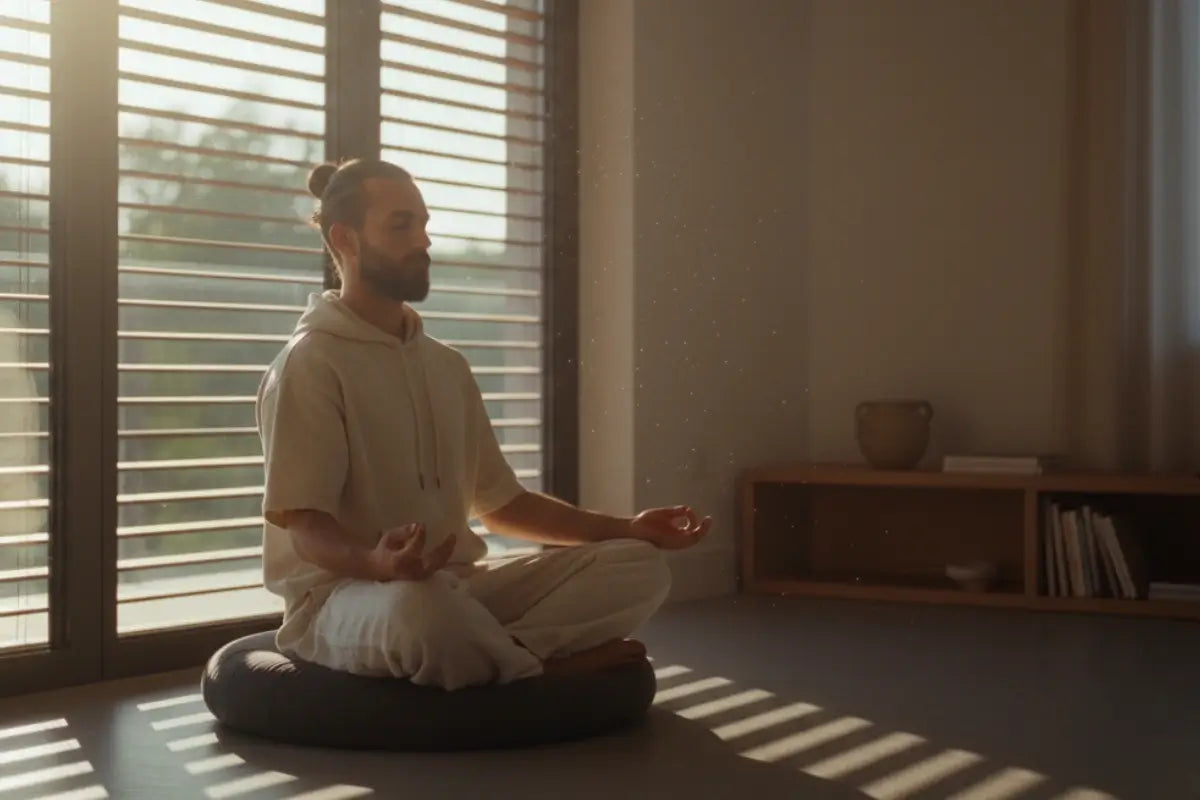Can Meditation Help with OCD? What the Research Says

Intrusive thoughts, relentless doubts, or constant rituals can dominate daily life for those with OCD, making even simple tasks exhausting.
Ignoring these obsessions and compulsions often worsens anxiety, disrupts routines, and strains relationships.
But emerging research suggests meditation might offer relief, calming the mind and reducing obsessive patterns. Could a mindful practice be a lifeline for OCD sufferers?
Key Takeaways
Meditation Supports Treatment: Use it alongside CBT, ERP, or medication to help manage OCD symptoms.
Calms Anxiety Quickly: Meditation slows racing thoughts and eases stress, giving your mind a break.
Improves Focus and Emotional Control: Regular practice helps you handle urges and reactions more mindfully.
Increases Self-Awareness: Mindfulness helps you notice obsessive thoughts and triggers without acting on them.
Start Small and Be Patient: Short, consistent sessions work best, and professional guidance ensures safety.
What is OCD?
Obsessive-Compulsive Disorder (OCD) is a mental health condition in which individuals experience persistent, unwanted thoughts (obsessions) and feel compelled to perform repetitive behaviors (compulsions) to relieve distress, according to psychiatry.org.
The exact cause of OCD remains unclear, and there is no single explanation; it likely arises from a combination of biological, genetic, and environmental factors. Key factors that may contribute include:
Brain differences: Overactivity in areas like the orbitofrontal cortex, anterior cingulate cortex, thalamus, and basal ganglia.
Neurotransmitter imbalances: Serotonin, dopamine, glutamate, and GABA may influence symptom development.
Genetics: OCD can run in families, though most children of parents with OCD do not develop the disorder.
Environmental factors: Stressful life events or cultural influences can shape the content of obsessions and compulsions.
PANDAS/PANS: Rare childhood-onset OCD may follow infections, such as strep throat, causing sudden, severe symptoms.
OCD can significantly affect daily life, making routine tasks, work, or social interactions challenging.
Effective management combines cognitive-behavioral therapy (exposure and response prevention) and/or medication (SSRIs).
Additionally, lifestyle strategies like structured routines, mindfulness, and supportive family involvement can reduce distress.
With treatment and coping strategies, many people with OCD experience meaningful improvement and regain control over their daily lives.
Can Meditation Help with OCD?
Meditation cannot cure OCD, but research shows it can be a powerful support when combined with treatments like CBT, ERP, or medication.
It helps calm anxiety, improve focus, regulate emotions, and increase self-awareness of obsessive thoughts and triggers.
By teaching non-judgmental observation, meditation reduces compulsive reactions, promotes relaxation, and supports healthier coping, making it a valuable complementary tool for managing OCD.

Can Meditation Replace Traditional OCD Treatments?
Meditation cannot replace traditional OCD treatments like CBT and ERP but can serve as a helpful complement.
It may enhance therapy effectiveness, increase distress tolerance, improve focus, and promote non-judgmental awareness. However, it’s not a standalone treatment and should be practiced with professional guidance.

Benefits of Meditation for People with OCD
Calms Anxiety and Lowers Stress Quickly
When stress runs high, OCD symptoms often feel heavier and harder to handle. Meditation steps in by slowing down racing thoughts and calming the body, which helps ease the urge to react to obsessions right away.
It gives your mind a break, making space to respond instead of getting stuck in the cycle. One large review found that mindfulness meditation eased both anxiety and depression.
Another study showed that people in a mindfulness program felt less anxious and handled stressful situations better, proof that meditation works quickly to bring relief.
Helps Control Emotional Overreactions
When you live with OCD, it’s easy for emotions to spiral out of control, making obsessive thoughts feel even heavier.
Meditation gives your mind a chance to pause, so you don’t instantly react with fear or stress. According to a study in Frontiers in Neuroscience, just seven days of short daily meditation lowered emotional intensity and negative thinking, showing how simple practice can bring real emotional relief.
Boosts Focus and Reduces Compulsive Actions
Staying focused makes a big difference for people with OCD because constant intrusive thoughts can steal attention and push them into compulsive actions.
When you train your mind to focus better, you can catch those urges before they take over and redirect your energy toward what truly matters.
Meditation helps build that kind of focus. In fact, a study in the Journal of Frontiers in Human Neuroscience showed that even just 10 minutes of mindfulness meditation improved people’s attention.
Participants stayed more accurate and quicker on challenging tasks, showing their brains used mental energy more wisely. This sharper focus can help people with OCD feel more in control.
Stops Obsessive Thoughts from Taking Over
Meditation helps people with OCD stop obsessive thoughts from taking over by training the mind to notice a thought without getting trapped in it.
Instead of fighting or feeding the thought, meditation teaches you to step back and let it pass. This makes the mind feel calmer and less controlled by worries.
According to the Journal of Medicine, a review of 16 clinical trials found that people who practiced meditation along with medication showed greater relief from OCD symptoms than those who used medication alone.
Improves Sleep and Promotes Relaxation
When you live with OCD, lack of sleep can make obsessive thoughts and compulsions feel even stronger.
Meditation calms your mind and body, helping you relax and drift into deeper rest. The Journal of Author Manuscripts reports that mindfulness meditation improved sleep quality compared to placebo-style programs, making it a powerful tool for OCD relief.
Makes You Aware of Triggers and Patterns
Meditation, especially mindfulness-based practices, is proving to be a valuable tool for people with OCD by helping them notice the thoughts and triggers that fuel their symptoms.
Research published in the Journal of Obsessive-Compulsive and Related Disorders found that mindfulness-based interventions (MBIs) can reduce obsessive-compulsive and depressive symptoms while improving overall self-awareness.
By practicing mindful observation, individuals learn to recognize intrusive thoughts and urges as temporary mental events rather than threats that demand immediate action.
This shift in perspective reduces the pressure to respond with compulsions. Studies also show that mindfulness-based therapies, like Mindfulness-Based Cognitive Therapy, encourage non-judgmental awareness and disrupt patterns of rumination, giving people greater flexibility in how they react to triggers.
As highlighted in Clinical Psychology Review, mindful observation enhances emotional regulation, lowers reactivity, and helps people break free from automatic thought–behavior cycles.
In simple terms, meditation doesn’t aim to erase obsessive thoughts, it teaches individuals to see them differently, reducing their power and opening the door to healthier coping strategies.
Challenges People with OCD Face When Starting Meditation
Intrusive Thoughts: Constant unwanted thoughts interrupt focus and make it hard to stay present.
Perfectionism Pressure: Worrying about doing meditation “the right way” creates extra stress.
Restlessness: Sitting still can heighten feelings of anxiety and discomfort.
Doubt from Checking: Obsessive checking leads to second-guessing the practice itself.
Compulsions: Repetitive urges make it difficult to remain calm and still.
Frustration with Progress: Slow improvement can trigger self-criticism and impatience.
Control Struggles: Difficulty letting go of control prevents deep relaxation and mindfulness.
Can Meditation Worsen OCD Symptoms?
Meditation can sometimes worsen OCD by intensifying focus on obsessions, increasing panic, or becoming a compulsion if misused.
However, when guided by a professional and combined with CBT or ERP, mindfulness can support emotional regulation, reduce compulsions, and help individuals accept intrusive thoughts without judgment.
FAQs
Is meditation a cure for OCD?
Meditation is not a cure for OCD but can support treatment by increasing awareness of obsessive thoughts, reducing resistance, building distress tolerance, and encouraging non-judgment. Used alongside ERP therapy and medication, it helps manage symptoms, though professional guidance is essential to avoid reinforcing compulsions.
How long should meditation sessions be for someone with OCD?
For people with OCD, meditation should begin with very short sessions, just a few minutes, to build consistency without overwhelm. Gradually increase duration if comfortable, though even brief daily practice is effective. Short techniques like the three-minute breathing space help. Always consult professionals if symptoms worsen.
What should you do if meditation triggers your OCD symptoms?
If meditation triggers OCD symptoms, pause and acknowledge the thoughts without resisting or performing compulsions, then gently return focus to your breath or body. If symptoms persist, try alternative grounding techniques and consult your therapist, as mindfulness works best alongside structured treatment like ERP.




